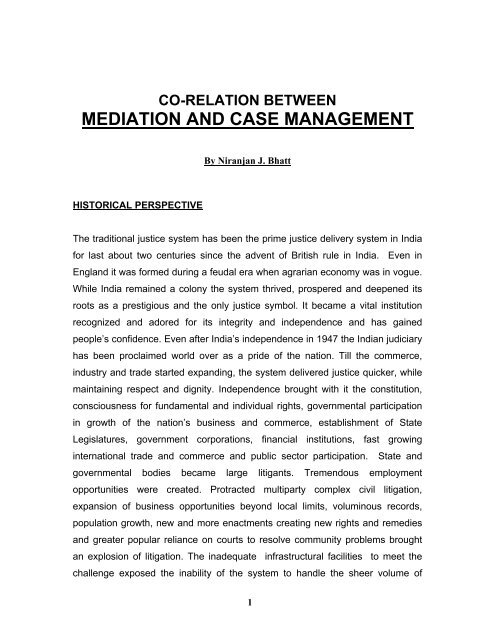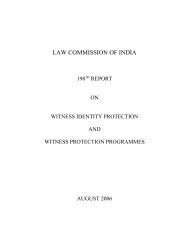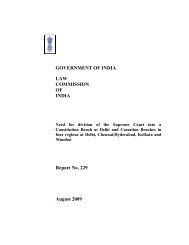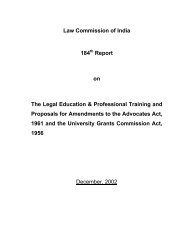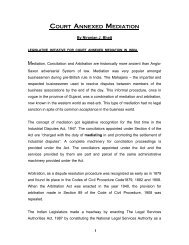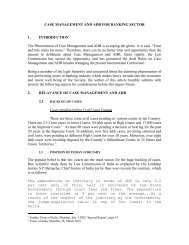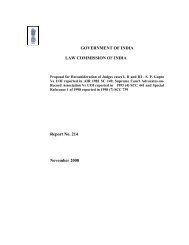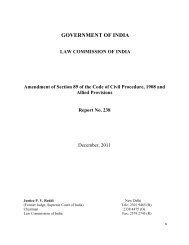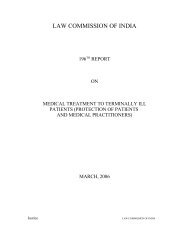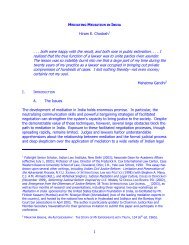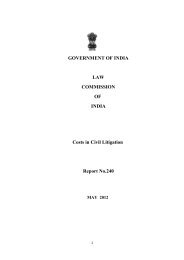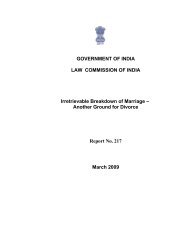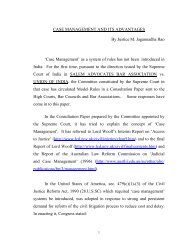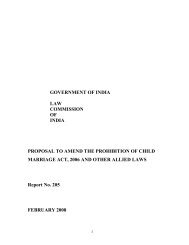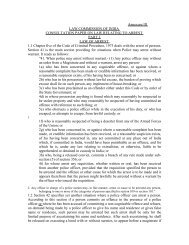Correlation Between CASE MANAGEMENT And MEDIATION - Law ...
Correlation Between CASE MANAGEMENT And MEDIATION - Law ...
Correlation Between CASE MANAGEMENT And MEDIATION - Law ...
Create successful ePaper yourself
Turn your PDF publications into a flip-book with our unique Google optimized e-Paper software.
CO-RELATION BETWEEN<strong>MEDIATION</strong> AND <strong>CASE</strong> <strong>MANAGEMENT</strong>By Niranjan J. BhattHISTORICAL PERSPECTIVEThe traditional justice system has been the prime justice delivery system in Indiafor last about two centuries since the advent of British rule in India. Even inEngland it was formed during a feudal era when agrarian economy was in vogue.While India remained a colony the system thrived, prospered and deepened itsroots as a prestigious and the only justice symbol. It became a vital institutionrecognized and adored for its integrity and independence and has gainedpeople’s confidence. Even after India’s independence in 1947 the Indian judiciaryhas been proclaimed world over as a pride of the nation. Till the commerce,industry and trade started expanding, the system delivered justice quicker, whilemaintaining respect and dignity. Independence brought with it the constitution,consciousness for fundamental and individual rights, governmental participationin growth of the nation’s business and commerce, establishment of StateLegislatures, government corporations, financial institutions, fast growinginternational trade and commerce and public sector participation. State andgovernmental bodies became large litigants. Tremendous employmentopportunities were created. Protracted multiparty complex civil litigation,expansion of business opportunities beyond local limits, voluminous records,population growth, new and more enactments creating new rights and remediesand greater popular reliance on courts to resolve community problems broughtan explosion of litigation. The inadequate infrastructural facilities to meet thechallenge exposed the inability of the system to handle the sheer volume of1
caseloads efficiently and effectively. The clogged court houses have startedbecoming unpleasant compulsive forums instead of the temple of justice. Insteadof waiting in queues for years and pass on the litigation by inheritance people areminded either to drop going to courts or have started resorting to extra judicialremedies in the form of violation of law and order. Commercial interests avoiddoing business in places where access to efficient and cost effective justice is notreadily available. Delays in quick disposal of cases have inspired ingenuity oflawyers into carving out interim remedial actions which have kept courts busyhearing pretrial motions. The society is on the verge of loosing confidence in lawcourts threatening their dignified existence. The filing in courts have starteddownward trend creating a vicious slow growth ratio under the apprehension thatdisposal of cases will take years.This situation has been faced historically by most of the democratic countriesworld over. USA was the first to introduce drastic law reforms about 20 yearsback and UK has recently followed the suit. Handicapped by historicalhelplessness India has started late, though it has now circumstances to pick upintroduction and implementation of law reforms faster than any other country ofthe world. This is because of the foresight, dynamism and independence of theIndian Judiciary and the respect the Indian legislature has in the visionaryinterpretations made by Indian Judges in developing law and social wisdom byprecedents set by judicial pronouncements.Since the inception of the economic liberalization policies in India andacceptance of law reforms world over, the legal opinion leaders have concludedthat the application of vigorous mediation mechanisms to commercial and civillitigation is a critical solution to the profound problem of arrears of cases in CivilCourts in India. The former Chief Justice of Indian Supreme Court, Mr. JusticeA.M. Ahmadi took a bold step forward by forming an Indo US study team whichworked together, made a comprehensive study and made recommendationshow reforms suitably adopted to Indian conditions can modernize the Indian2
justice system. The study team consisting of Indian scholars and experiencedexperts from United States sponsored by ISDLS* made three sets ofrecommendations for modernizing Indian Civil Justice System : CourtAdministration, Case Management and Alternative Dispute Resolution. Theproposal included introduction of Order IX A to include formally the concept of thecase management in the Code of Civil Procedure.Though the provisions of the Case Management are yet not formally introducedin the Code, those judges who exercise judicial control in pretrial proceedings ontheir own initiatives by implementing provisions of Order X, XI, XII and XIII [briefsummary annexed at the end of this paper] of the Code are more successful than othersin the expeditious disposal of cases. City Civil Court Rules framed by GujaratHigh Court provide for summons for directions immediately after the filing ofwritten statement, which did help in the initial years of their introduction inproviding for case management concepts without so naming them. However,they were not vigorously followed in later years and have remained on statutebook without being followed. Indian Parliament has taken a very bold stepforward (unmatched by any country other than US and UK) by introducing ADRin its legal system. Another bold step in introducing case managementprocedures as a mandate of law will help in utilization of ADR procedures moreeffectively.THE AHMEDABAD INDO-US EXCHANGE PROGRAMMEIn a world wave of global law reforms a group of Indian faculty attended “36Countries ISDLS Rule of <strong>Law</strong> Conference” held at University of California,Berkeley, which considered innovation in dispute resolution methods. The authorof this paper made a presentation on the need for taking initiative by individuallawyers and Bar Associations. Gaining by experience of attending the*Institute for Study and Development of Legal Systems (ISDLS) is a San Francisco based non profitnon governmental organization promoting law reforms world over.3
conference the lawyers of Ahmedabad Bar Association were motivated toorganize a conference on “Delays and their Solutions”. Some of the topicsdiscussed at Ahmedabad Conference included “Global Objectives, problems andreform alternatives in the light of widely shared aims of democracy and economicdevelopment”, “Managing the Unmanageable”, “Basic concepts of theory andpractice of case management and Alternative Dispute Resolution Methods”, “Theneed for discipline in law and changing the attitudes”. The conference broughtawareness on the problem of delay and their solutions, and concluded thatmediation and case management would help improve the civil and commercialjustice system in India. It was dawned on the participants that the ancient Indianlegal culture of resolving disputes with the help of a mediator, which becameextinct with the advent of British Rule, needed to be revived. The conferencewas attended by Mr. Stephen Mayo, Executive Director of ISDLS, USA andProfessor Mr. Hiram Chodosh of Case Western Reserve University, Ohio, USA.They were impressed by the conference and recommended that the Agenda ofthe Conference could be adopted as a model agenda for South East Asia. Twosenior lawyers of Ahmedabad settled a Public Charitable Trust by name Institutefor Arbitration Mediation Legal Education and Development (AMLEAD), with theobjects of promoting ADR and imparting continuing legal education to lawyers,litigants and judges. With the help of ISDLS three groups of US mediationtrainers visited Ahmedabad in January, April and August 2001 and impartedmediation training to about 120 lawyers. The trainers from USA included ADRadministrators of US Courts, Chief Mediators of 6 th and 9 th US Circuit Courts,teachers, lawyers and judges who are experienced in implementing the conceptsof Mediation and Case Management in US Courts. Three Indian delegationsvisited California in November 2000, January 2001 and February 2001 andobserved how combination of Mediation and Case Management workedeffectively. A meeting with the Associate Justice Ms. Sandra Day O’Connor andAssociate Justice Mr. Stephen Breyer of the US Supreme Court during theirAhmedabad visit on September 13, 2001 gave a unique opportunity to4
Ahmedabad lawyers to have a dialogue with them on the importance of starting alawyer run Mediation Centre. The Ahmedabad Bar Association and AMLEADopened the first lawyer run Mediation Centre at Ahmedabad. The Centre haspublished a brochure to provide guidance to litigants, lawyers and Judges. TheChief Justice of Indian Supreme Court Mr. Justice B.N. Kirpal with his dynamism,judicial activism and pragmatic leadership inaugurated the CENTRE on July 27,2002 in presence of legal fraternity and leading citizens of Gujarat andrecommended the opening of such centres at other places also. A course onTheory and Practice of Mediation is also now introduced in the <strong>Law</strong> School byAMLEAD and Gujarat <strong>Law</strong> Society. Now India is ready and prepared tosupplement its conventional adversarial legal system with modern improvisation.Mediation and Case Management have now become a global phenomenon.INDIAN LEGISLATURE’S BOLD STEPJudicial Reforms in any country is a slow process. Compared to other countriesof the world Indian Legislature, in the 53 rd year of its birth, enacted the CivilProcedure Code (Amendment) Act, 1999 and introduced mandatory ADRprocedures. Another amending Act was introduced and passed in 2002 whichhas been accepted and welcomed in the country and it has now been broughtinto force with effect from July 1, 2002. In the forthcoming meeting of the ChiefJustices of all Indian High Courts summoned by Chief Justice of India theattention on the concept of Mediation and Case Management will be focused.Now India is on the threshold of implementing progressive law reforms – a bigstep forward towards modernization of its justice delivery system.THE CONCEPT OF <strong>MEDIATION</strong>:In the adversarial system the litigant becomes insignificant, almost a non entity.He goes to the court “to fight the battle”. Resolving disputes has become lessimportant. Litigants have become partners in the problems rather than in the5
solutions. We always negotiate business deals, we negotiate propertytransactions, we discuss the terms of a job and in India we even negotiate amarriage. Can we not negotiate the settlement of disputes? Negotiatingsettlement of disputes is recognized as the best form of dispute resolution at thebeginning of 21 st Century because it gives maximum satisfaction to the partieswho actively participate in the process.It has also been now recognized that negotiated settlement becomes moreeffective if a neutral, skilled and trained mediator, helps the parties. Mediation orconciliation is thus a voluntary process of negotiating the resolution of a disputewith the assistance of a mediator. Conciliation and mediation are more or lesssynonyms, though mediation goes further than conciliation by allowing theneutral third party to suggest terms on which dispute might be resolved. TheMediation is faster than the conventional adversarial system of dispensingjustice. It is flexible as there is no set formula of complicated procedure and leadsto an imaginative, creative, cost efficient, convenient and lasting solution of adispute bringing parties closure avoiding hostility and maintaining relationship.In modern complex society mediation has acquired global acceptance and hasbecome part and parcel of the conventional system of justice. With the growth ofcommerce, industry and international business, the adversarial system of justiceneeds to be aided by various other indigenous alternatives catering to the needand choice of the litigants. Just as different quicker transport systems havehelped in reducing traffic jams, the variety of Alternative Dispute ResolutionMethods have provided to the consumers of justice a choice of selectingalternatives for resolving their disputes. However, it is necessary that thesealternatives are provided as a part of the same time tested system which hasacquired the confidence of the people because of its integrity and impartiality.The court is like a parental institution for resolution of disputes and if ADRmodels are directed under the courts’ supervision, at least in those cases whichare referred to ADR procedures by the courts, the effort for dispensing justice6
can become more coordinated. ADR agencies can become part and parcel ofcourt system which would provide more alternative channels under its owncontrol and supervision. This would ensure complimentary systems of justice andnot competitive procedures. It is also necessary to decide which case is suitablefor which ADR procedure. Who will decide this? <strong>And</strong> when? This will require ajudge to adopt a managerial role. Cases pending in the Court are within thecontrol of a judge. Traditionally a judge hears two adversaries, weighs theevidence on record and gives the judgement. This judicial role is more or lesspassive and takes no initiative for the progress of the case. Till the trial beginsthe judge almost plays no role except passing interim orders on applicationsmoved by either side. Even for such applications progress of the case dependsupon the initiative taken by lawyers of the parties. In the words of Judge RobertF. Peckham , “Mis-management or non-management of the cases can causeconsiderable delay leading to uncertainty in business and personal affairs andoften crushing expenses to one or more of the parties”. Experience has revealedthat in those cases where a judge exercises more pre-trial control, progresstowards conclusion is faster. In the last decade due to the introduction of theconcept of the case management in the Federal District Courts in the UnitedStates, the disposal of the cases by trial has increased. It is also found that thecourts became more efficient in dealing with the cases. This new role of a judgeas a case manager promises to increase judicial productivity.<strong>CASE</strong> <strong>MANAGEMENT</strong>The case management is a judicial process which provides effective, efficientand purposeful judicial management of a case so as to achieve a timely andqualitative resolution of a dispute. It assists in early identification of disputedissues of facts and law, establishment of a procedural calendar for the life of thecase and exploration of a possibility of a resolution of disputes throughmethods other than court trial. The case management requires the early7
assignment of a case to a judge who then exercises judicial control over the caseimmediately after it is filed and keeps its track at every stage. The judge appliesjudicial process to the rival contentions at the earliest stage after filing of thewritten statement and secures active participation and joint communicationamongst the parties and the lawyers for the smooth progress of the case. It helpsthe parties and lawyers in identifying the real controversies and seeking earlyresponse from the other side on the questions of facts and law raised by theopponents minimizing or narrowing down the controversies. At this stage, itbecomes necessary for the court to apply its mind to the facts of the case andreduce the scope of trial as far as possible by referring the case to AlternativeDispute Resolution Methods. This can be done by the judge by examining thefacts of the case jointly with the lawyers of the parties. The Code of CivilProcedure, 1908 has made adequate provision in Order X to Order XIII forincorporating pretrial case management concepts. This provision requires theJudge to exercise control over the case at the first hearing. However, if the firsthearing itself is delayed the judicial control will not help in expeditious conclusionof the case and therefore, it is necessary to require the judge to be seized of thematter immediately after filing of the written statement.<strong>CASE</strong> <strong>MANAGEMENT</strong> AND <strong>MEDIATION</strong> ARE COMPLEMENTARYWith the global acceptance of the Alternative Dispute Resolution Methods, theCode of Civil Procedure, 1908 in India, as recently amended, introduced theADR procedures which include arbitration, conciliation, mediation, judicialsettlement and settlement through Lok Adalat. The arbitration is more or lessadversarial and the arbitrator is required to give an award which is like a courtgiving a judgement. Judicial settlement has not been aggressively pursuedbecause the judges are not left with enough time from the routine work. The LokAdalat has proved to be successful in a few types of cases such as motoraccident cases. The conciliation and mediation which are synonyms offer themaximum scope of acceptance by the litigants because they sound to be most8
ealistic. It is therefore necessary for the courts in pending cases to refer thecases to mediation or conciliation. Now that law has made ADR methods a partof our legal system it is necessary that while exercising judicial control a judge atthe earliest stage decides if a case is having an element of settlement which canbe further explored by referring the case, inter alia, to mediation. Thereforebefore referring a case to mediation, a judicial mind must decide whether it iscapable of being resolved through any of the ADR mechanisms. It is thereforethat managerial skill of a judge is a pre-requisite for referring the case to amediator. This basic requirement is of foremost importance before the mediationprocess can begin. A reference of all the cases to mediation without applicationof mind may become an empty formality.While referring a case to mediation after a judge sees an element of settlement init, it is necessary to fix a time limit for completing the mediation procedures. Inabsence of such time limit cases are likely to be shelved. It is, therefore,necessary to exercise a further judicial control requiring to complete mediationprocess expeditiously. In appropriate cases the given time may not be sufficientand may be required to be extended further. If the judge is satisfied that theprogress towards the settlement is not being made, he may find that themediation is likely to fail and no further time is required to be wasted. A judgemay find that the case deserves to be shuffled to any other form of ADR. A judgemay even conclude that certain issues may be settled through mediation andothers require a trial. Such an exercise of control by the judge will also bring theconcept of the answerability by the parties and the mediator. Thus mediationprocess is complementary to the courts and actually furthers the court’s owninterest in reducing its case load to manageable levels. Rather than presenting aparallel system of justice that is competitive with courts, co-ordination betweencase management by a court and assisted negotiation through mediator selectedby the parties, will provide additional tools by the same system which will inspireconfidence and provide continuity of the process. When court considers itappropriate to refer the case to mediation and continues to have its managerial9
supervision, court will remain a central institution for the system. This will alsoestablish a public-private partnership between the courts and the community. Apopular feeling that court works hand-in-hand with mediation facility will producelawful and enforceable settlements.The Code of Civil Procedure, 1908 and the provisions for ADR mechanismsmade therein can be effectively utilized only if the managerial skills of a judge areproperly understood and effectively implemented. Unless both i.e. the casemanagement techniques and ADR procedures are properly used as a part of thesame system, none of them can be effective. Whether the mediator makes theprogress, parties co-operate, exchange of information takes place or whetherthe negotiations are likely to fail are the questions which require judicialsupervision. Again, briefing the parties and their advocates in a proper mannerby a judge will prepare them for accepting the procedures positively and securetheir willing participation. Court will benefit administratively from resolution ofmany civil disputes through mediation while simultaneously retaining its vital roleas the final arbiter. The Judge will appreciate that mediation is a part of the samejudicial system and reference of cases to mediation will spare the judge moretime for the cases which require judicial determination.A FEW SUGGESTIONSIndia has now whole hearted legislative approval for beneficial law reformscontained in the Code of Civil Procedure, 1908,The Arbitration and ConciliationAct, 1996 and the Legal Services Authorities Act, 1987. It is therefore, necessaryto provide guidelines and promote the reforms extensively by utilizing theprovisions made in the last mentioned Act.• The provisions made in the Arbitration and Conciliation Act, 1996regarding the process of conciliation are required to be made applicable tomediation also because there is no real difference between the two. The10
High Courts can frame rules under Section 89 (2) (d) read with Section122 of the Code of Civil Procedure to make mediation procedureseffective immediately.• In order to establish mediation as a viable alternative, it is crucial toprovide education about benefits of the process to the community, themembers of the Bar and the Courts. It will be necessary to familiarize thepotential consumers of mediation services with the nature of the process,the ways mediation can benefit them and ways it differs from arbitrationand trial. Equally important is to promote and encourage the managerialqualities of a judge. Coordinated efforts will have to be promptly started toeffectively use the ADR provisions incorporated in the Code of CivilProcedure, 1908.• Brochures explaining availability of mediation and other ADR methodsmust be published and handed over to the plaintiffs at the time of filing ofthe suits and to the defendants along with the summons of the suit.Directions to the Principal Judges of all courts in any acceptable modesare required to be issued to all the courts in their jurisdictions to assign thecases to specific courts and keep the track thereof from the beginning andenforce the case management techniques.• To achieve the success in reforms’ implementation, pilot projects in someselected cities can be introduced so as to utilize the experience later inother courts. A few courts can be selected to follow mediation and casemanagement procedures on experimental basis and judges who areallotted such work can be specially selected on the basis of their aptitudeand they can be specially trained for the assignments.• Cases for the reference to mediation can be categorised initially to includecases having minimum discovery requirements and maximum settlementelements, such as cases relating to money recovery, loan default, familydisputes, etc.• A panel of mediators should be immediately formed and for the purpose,programmes for imparting basic training and orientation to the intending11
mediators should be organised. Community leaders, experienced andrespected businessmen, retired judges, experts in different fields, retiredbureaucrats and lawyers can be persuaded to serve as mediators. BarCouncils, Bar Associations and Judicial Academies can join hands toorganize workshops and conferences on the subjects.• Retired judges, desiring to act as mediators can be persuaded toconsciously address a general concern over the difference betweenmindset of a Judge and of a Mediator. Appointment of retired Judges asmediators can inspire great confidence in the mediation process amongstthe participants with a familiarisation programme with mediation processto avoid any role confusion.• International organizations like Asian Development Bank and World Bank,which have large funds for the developmental purposes, should beapproached to provide and promote international training facilities, to setup pilot projects and specialized infrastructural facilities for exchange ofknowledge and experience and also organize regional conferences andtraining the trainers programmes. Formation of joint Bench-BarCommittees to implement the reformative provisions of law may provevery useful.• The courts in which the pilot projects are to work, are to be provided withcomputers and case tracking facilities and there shall be effectivesupervision of the pilot projects. Apart from that, in courts, there shall beintensive training imparted about the basic ideas to the persons who aregoing to be in-charge, so that the case management principles and theschedules and the ADR processes are well-administered.• State, Municipal Corporations and Government Corporations, who are thelargest litigants, should be drawn into the process of Mediation by framingappropriate schemes.• Till Court annexed mediation programmes and proper infrastructuralfacilities are established it would be appropriate at least to providemediation facilities through private reliable mediation centres run by the12
Bar Associations and/or non Governmental organizations and appropriatefunds or grants can be provided to them. It is advisable to provide suchmediation facilities at the doorsteps of the court houses.Last, but not theleast, is the importance to identify the right persons for implementationand to inculcate the sense and feeling of responsibility and alleviate thefeeling of extra burden on an existing judicial officer. It is being felt thatquite many new ideas fail because of the unwillingness to go that extramile by the person, who is within the settled pay scale and unfortunatelythinks that he is not going to get any incentive for that extra mile heploughs. The system as it works today evaluates a lower court judge’swork on disposal and considers more merits of the man if “disposal” isgreater and if “settlements” are more in his court, he may not be looked asone being that competent. That idea of evaluation of the performance ofjudges and also the incentive for going that extra mile further has to beevolved within the system.• The world is becoming smaller with the faster communication facilities.International exchange of knowledge, experience and research havewidened the horizons of the people of the world. The ties betweendemocratic countries are becoming stronger. The world is progressingtowards unity of thoughts. India and USA being two largest democraciesof the world can join together on long term basis to utilize mutual wealth ofknowledge to evolve a Research Foundation for providing continuing legaleducation, which will help in promoting the economic, commercial andsocial welfare of their people.Niranjan J. Bhatt is a senior Advocate in Ahmedabad. He is the founder and the Managing Trustee of the Institutefor Arbitration Mediation Legal Education and Development (AMLEAD) and a Convener of the AhmedabadMediation Centre, the first lawyers run Mediation Centre of India. Mr. Bhatt received advance mediation trainingfrom Harvard <strong>Law</strong> School PIL Programme and was a member of Indo-US Central Study Team.This paper waspresented by him at the fourth Indo-Us legal forum meet at Washington DC on october15,2002,as a member ofIndian delegation led by Chief Justice of India Mr.Justice BNKirpal.13
AnnexureBRIEF SUMMARY OF A FEW IMPORTANT PROVISIONS IN INDIAN CIVILPROCEDURE CODE RE. <strong>CASE</strong> <strong>MANAGEMENT</strong>Settlement of disputes outside the court:Civil Procedure S.89 (1) Where it appears to the court that thereCode 1908exist elements of a settlement which may beInserted byacceptable to the parties, the court shallAmendmentformulate the terms of settlement and giveAct 1999them to the parties for their observationsDate ofand after receiving the observations of theImplementationparties, the court may reformulate the termsfromof a possible settlement and refer the same1-07-2002 for ----(a) arbitration(b) conciliation(c) judicial settlement through Lok Adalat or(d) mediation.(2) Where a dispute has been referred –(a)(b)(c)(d)for arbitration or conciliation, the provisions of Arbitration and conciliationAct, 1926 (26 of 1996) shall apply as if the proceedings for arbitration orconciliation were referred for settlement under the provisions of the Act;to Lok Adalat, the court shall refer the same to Lok Adalat in accordancewith the provisions of sub-Section (1) of section 20 of the Legal ServicesAuthority Act, 1987 (39 of 1987) and all other provisions of that Act shallapply in respect of the dispute so referred to the Lok Adalat;for judicial settlement, the court shall refer the same to a suitableinstitution or person and such institution or person shall be deemed to bea Lok Adalat and all the provisions of the Legal Services Authority Act1987 (39 of 1987) shall apply as if the disputes were referred to a LokAdalat under the provisions of that Act;for mediation, the court shall effect a compromise between the partiesand shall follow such procedure as may be prescribed.14
[Only description of rules. For full text, please see Civil Procedure Code, 1908]ORDER XEXAMINATION OF PARTIES BY THE COURTRulesDescription1 Ascertainment whether allegations in pleadings are admitted or denied1A Direction of the Court to opt for any one mode of alternative disputeresolution1BAppearance before the conciliatory forum or authority1C Appearance before the Court consequent to the failure of efforts ofconciliation2 Oral examination of party, or companion of party3 Substance of examination to be written4 Consequence of refusal or inability of pleader to answerORDER XIDISCOVERY AND INSPECTIONRulesDescription1 Discovery by interrogatories2 Particular interrogatories to be submitted3 Costs of interrogatories4 Form of interrogatories5 Corporations6 Objections to interrogatories by answer7 Setting aside and striking out interrogatories8 Affidavit in answer, filing9 Form of affidavit in answer10 No exception to be taken11 Order to answer or answer further12 Application for discovery of documents13 Affidavit of documents14 Production of documents15 Inspection of documents referred to in pleadings or affidavits16 Notice of produce17 Time for inspection when notice given15
18 Order for inspection19 Verified copies20 Premature discovery21 Non-compliance with order for discovery22 Using answers to interrogatories at trial23 Order to apply to minorsORDER XIIADMISSIONSRulesDescription1 Notice of admission of case2 Notice to admit documents2A Documents to be deemed to admitted if not denied after service of notice toadmit documents3 Form of notice3APower of Court to record admission4 Notice to admit facts5 Form of admissions6 Judgement on admissions7 Affidavit of signature8 Notice to produce documents9 CostsORDER XIIlPRODUCTION, IMPOUNDING AND RETURN OF DOCUMENTSRulesDescription1 Original documents to be produced at or before the settlement of issues2 [Omitted]3 Rejection of irrelevant or inadmissible documents4 Endorsements on documents admitted in evidence5 Endorsements on copies of admitted entries in books, accounts and records6 Endorsements on documents rejected as inadmissible in evidence7 Recording of admitted and return of rejected documents8 Court may order any document to be impounded9 Return of admitted documents16
10 Court may send for papers from its own records or from other Courts11 Provisions as to documents applied to material objectsRelevant provisions of the Arbitration and Conciliation Act, 1986, whichshould be made applicable to the mediation proceedings]S. 61. Application and scope – (1) Save as otherwise provided by any law for the timebeing in force and unless the parties have otherwise agreed, this Part shall apply toconciliation of disputes arising out of legal relationship, whether contractual or not andto all proceedings relating thereto.(2) This part shall not apply where by virtue of any law for the time being in force certaindisputes may not be submitted to conciliation.S.62. Commencement of conciliation proceedings:-(1) The party initiating conciliation shall send to the other party a written invitation toconciliate under this Part, briefly identifying the subject of the dispute.(2) Conciliation proceedings shall commence when the other party accepts in writingthe invitation to conciliate.(3) If the other party rejects the invitation, there will be no conciliation proceedings.(4) If the party initiating conciliation does not receive a reply within thirty days from thedate on which he sends the invitation, or within such other period of time asspecified in the invitation, he may elect to treat this as a rejection of the invitation toconciliate and if he so elects, he shall inform in writing the other party accordingly.S.63 Number of Conciliators:-(1) There shall be one conciliator unless the parties agree that there shall be two orthree conciliators.(2) Where there is more than one conciliator, they ought, as a general rule, to act jointly.S.64 Appointment of conciliators:-(1) Subject to sub-section (2),-(a) in conciliation proceedings with one conciliator, the parties may agree on the nameof a sole conciliator;(b) In conciliation proceedings with two conciliators, each party may appoint oneconciliator;(c) in conciliation proceedings with three conciliators, each party may appoint oneconciliator and the parties may agree on the name of third conciliator who shall actas the presiding conciliator.17
(2) Parties may enlist the assistance of a suitable institution or person in connection withthe appointment of conciliators, and in particular, -(a) a party may request such an institution or person to recommend the names ofsuitable individuals to act as conciliator; or(b) the parties may agree that the appointment of one or more conciliators be madedirectly by such an institution or person:Provided that in recommending or appointing individuals to act as conciliator, theinstitution or person shall have regard to such considerations as are likely to securethe appointment of an independent and impartial conciliator and, with respect to asole or third conciliator, shall take into account the advisability of appointing aconciliator of a nationality other than the nationalities of the parties.S. 65 Submission of statements of conciliator:-(1) The conciliator, upon his appointment, may request each party to submit to him abrief written statement describing the general nature of the dispute and the points atissue. Each party shall send a copy of such statement to the other party.(2) The conciliator may request each party to submit to him a further written statementof his position and the facts and grounds in support thereof, supplemented by anydocuments and other evidence that such party deems appropriate. The party shallsend a copy of such statement, documents and other evidence to other party.(3) At any stage of the conciliation proceedings, the conciliator may request a party tosubmit to him such additional information as he deems appropriate.Explanation – In this section and all the following sections of this Part, the term“Conciliator” applies to a sole conciliator, two or three conciliators, as the case maybe.S. 66. Conciliator not bound by certain enactments:- The conciliator is not bound by theCode of Civil Procedure, 1908 (5 of 1908) or the Indian Evidence Act, 1872 (1 of 1872).S.67. Role of conciliator :-(1) The conciliator shall assist the parties in an independent and impartial manner intheir attempt to reach an amicable settlement of their dispute.(2) The conciliator shall be guided by principles of objectivity, fairness and justice,giving consideration to, among other things, the rights and obligations of theparties, the usages of the trade concerned and the circumstances surrounding thedispute, including any previous business practices between the parties.(3) The conciliator may conduct the conciliation proceedings in such a manner as heconsiders appropriate, taking into account the circumstances of the case, thewishes the parties may express, including any request by a party that theconciliator hear oral statements, and the need for a speedy settlement of thedispute.(4) The conciliator may, at any stage of the conciliation proceedings, make proposalsfor a settlement of the dispute. Such proposals need not be in writing and need notbe accompanied by a statement of the reasons therefor.S. 68. Administrative assistance:-18
In order to facilitate the conduct of the conciliation proceedings, the parties, or theconciliator with the consent of the parties, may arrange for administrative assistance bya suitable institution or person.S.69. Communication between conciliator and parties:-(1) The conciliator may invite the parties to meet him or may communicate with themorally or in writing. He may meet or communicate with the parties together or witheach of them separately.(2) Unless the parties have agreed upon the place where the meetings with theconciliator are to be held, such place shall be determined by the conciliator, afterconsultation with the parties, having regard to the circumstances of the conciliationproceedings.S.70. Disclosure of Information:-When the conciliator receives factual information concerning the dispute from a party, heshall disclose the substance of that information to the other party in order that the otherparty may have the opportunity to present any explanation which he considersappropriate:Provided that when a party gives any information to the conciliator subject to specificcondition that it be kept confidential, the conciliator shall not disclose that information tothe other party.S. 71. Co-operation of parties with conciliator:-The parties shall in good faith co-operate with the conciliator and in particular, shallendeavour to comply with requests by the conciliator to submit written materials, provideevidence and attend meetings.S. 72. Suggestions by parties for settlement of dispute:-Each party may, on his own initiate or at the invitation of the conciliator, submit to theconciliator suggestions for the settlement of the dispute.S.73. Settlement:-(1) When it appears to the conciliator that there exist elements of a settlement whichmay be acceptable to the parties, he shall formulate the terms of a possiblesettlement and submit them to the parties for their observations. After receivingthe observations of the parties, the conciliator may reformulate the terms of apossible settlement in the light of such observations.(2) If the parties reach agreement on a settlement of the dispute, they may draw upand sign a written settlement agreement. If requested by the parties, the19
conciliator may draw up, or assist the parties in drawing up, the settlementagreement.(3) When the parties sign the settlement agreement, it shall be final and binding onthe parties and persons claiming under them separately.(4) The conciliator shall authenticate the settlement agreement and furnish a copythereof to each of the parties.S. 74. Status and effect of settlement agreement:-The settlement agreement shall have the same status and effect as if it is an arbitralaward on the agreed terms on the substance of the dispute rendered by an arbitraltribunal under Section 30.S. 75. Confidentiality :-Notwithstanding anything contained in any other law for the time being in force, theconciliator and the parties shall keep confidential all matters relating to the conciliationproceedings. Confidentiality shall extend also to the settlement agreement, except whereits disclosure is necessary for purposes of implementation and enforcement.S. 76. Termination of conciliation proceedings:-The conciliation proceedings shall be terminated –(a) by the signing of the settlement agreement by the parties, on the date of theagreement; or(b) by a written declaration of the conciliator, after consultation with the parties, to theeffect that further efforts at conciliation are no longer justified, on the date of thedeclaration; or(c) by a written declaration of the parties addressed to the conciliator to the effect thatthe conciliation proceedings are terminated, on the date of the declaration; or(d) by a written declaration of a party to the other party and the conciliator, if appointed,to the effect that the conciliation proceedings are terminated, on the date of thedeclaration.S. 77. Resort to arbitral or judicial proceedings:-The parties shall not initiate, during the conciliation proceedings, any arbitral or judicialproceedings in respect of a dispute that is the subject matter of the conciliationproceedings except that a party may initiate arbitral or judicial proceedings where, in hisopinion, such proceedings are necessary for preserving his rights.S.78. Costs:-(1) Upon termination of the conciliation proceedings, the conciliator shall fix the costs ofthe conciliation and give written notice thereof to the parties.20
(2) For the purpose of sub-section (1) “costs” means reasonable costs relating to(a) the fee and expenses of the conciliator and witnesses requested by the conciliatorwith the consent of the parties;(b) any expert advice requested by the conciliator with the consent of the parties;(c) any assistance provided pursuant to clause (b) of sub-section (2) of section 64 andsection 68;(d) any other expenses incurred in connection with the conciliation proceedings and thesettlement agreement.(3) The cost shall be borne equally by the parties unless the settlement agreementprovides for a different apportionment. All other expenses incurred by the partiesshall be borne by the party.S. 79 Deposits:-(1) The conciliator may direct each party to deposit an equal amount as an advancefor the costs referred to in sub-section (2) of section 78 which he expects will beincurred.(2) During the course of the conciliation proceedings, the conciliator may directsupplementary deposits in an equal amount from each party.(3) If the required deposits under sub-sections (1) and (2) are not paid in full by boththe parties within thirty days, the conciliator may suspend the proceedings or maymake a written declaration of termination of the proceedings to the parties,effective on the date of that declaration.(4) Upon termination of the conciliation proceedings, the conciliator shall render anaccounting to the parties of the deposits received and shall return any unexpendedbalance to the parties.S. 80. Role of conciliator in other proceedings:-Unless otherwise agreed by the parties.-(a)(b)the conciliator shall not act as an arbitrator or as a representative or counsel of aparty in any arbitral or judicial proceedings in respect of a dispute that is thesubject of the conciliation proceedings;the conciliator shall not be presented by the parties as a witness in any arbitral orjudicial proceedings.S. 81. Admissibility of evidence in other proceedings:-21
The parties shall not rely on or introduce as evidence in arbitral or judicial proceedings,whether or any such proceedings relate to the dispute that is the subject of theconciliation proceedings,-(a) views expressed or suggestions made by the other party in respect of a possiblesettlement of the dispute;(b) admissions made by the other party in the course of the conciliation proceedings;(c) proposals made by the conciliator;(d) the fact that the other party had indicated his willingness to accept a proposal forsettlement made by the conciliator.22


